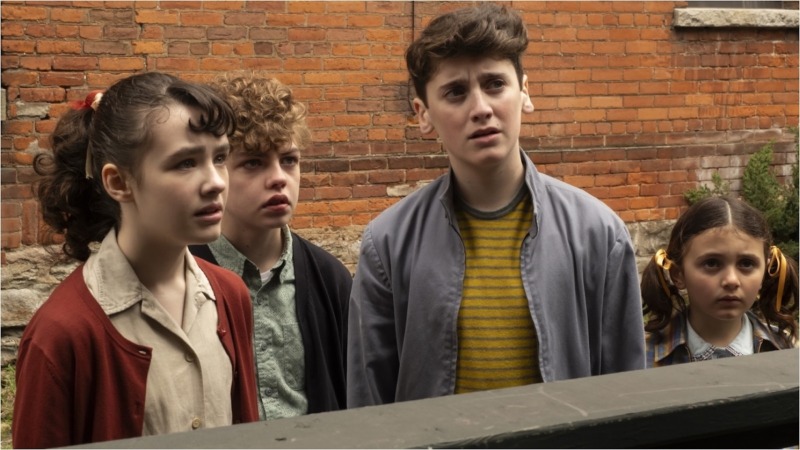It: Welcome to Derry Sinks Like a Lead Balloon
(Photo: Brooke Palmer/HBO)
The success of 2017’s It, the first theatrical treatment of Stephen King’s seminal, 1100 page horror novel, felt immediately significant. A year after the first season of Stranger Things, director Andy Muschietti delivered a louder, punchier, and scarier adaptation of the centerpiece King novel that Netflix had just pastiched (alongside It, Stranger Things is also indebted to lighter fare like E.T., The Monster Squad, Gremlins, and The Gate). His “Losers Club” of preteen heroes were mean and vulgar, with more fraught and dangerous home lives than the dorks of Stranger Things, and the demonic clown Pennywise (Bill Skarsgard) embodied a nastier, salacious form of villainy.
Despite the immediate interest in the newly revamped It—praise for the charismatic child performers, for Skarsgard’s unsettling Pennywise, and over $700 million at the global box office—there were clear cracks in Muschietti’s vision. The scares bordered on obvious and repetitive, always cranking up the volume and deploying CG-heavy monsters, and there were issues with shoddy pacing and a poor command of tone. (Maybe the film’s most faithful Stephen King homage?) This became even more apparent in 2019’s It Chapter Two, which picked up the Losers Club story 27 years later (a bifurcated time-jump structure first used by the 1990 miniseries version of It; the novel flits between young and older perspectives throughout). Chapter Two was a mess: far too long, obnoxious in its approximation of horror craft, and so loaded with King references and extended cameos that we can diagnose it with a fatal case of what we’ll call “adaptation anxiety”.
With Muschetti involved in the new prequel series It: Welcome to Derry (developing the series with his wife Barbara, and then directing multiple episodes), it’s clear why his visual style was adopted by showrunners Jason Fuchs and Brad Caleb Kane, and many designs, sets, and shots have been carried over and replicated in the eight-episode first season. (The first five episodes were screened for critics, along with detailed guidance on what story details are not to be spoiled.)
Set in 1962 (a quarter century before the 2017 film), the series takes a more expansive, multi-perspective look at Pennywise’s cosmic evil surging below the titular town, following a band of troubled middle-schoolers alongside a secret military project and how it affects the soldiers and their families. Arriving six years after audiences last ventured down the town’s sewers, Welcome to Derry is a flat and perplexing journey, filled to the brim with shoddy craft and dragging out its bog-standard King-like storyline, featuring some of his most irritating hallmarks. In a year of more creative mid-budget King adaptations—The Monkey, The Life of Chuck, The Long Walk—Welcome to Derry overestimates our interest in this world, which was already dwindling even before it committed the book’s final pages to screen.
Welcome to Derry begins, ironically, with someone trying to leave Derry. Fleeing an abusive father, young Matty (Miles Ekhardt) runs away from a screening of The Music Man at Derry’s Capitol Theater, hitching a ride with a seemingly typical nuclear family who, in true It fashion, start leaking with vulgar, violent thoughts and then trigger some explicit body horror. At the local school, Matty’s friends Teddy (Mikkal Karim-Fidler) and Phil (Jack Molloy Legault) don’t know how to process their friend’s disappearance, and shy classmate Lilly (Clara Stack) is grieving her secret and too-brief closeness with Matty after her own tragic bereavement (losing her father in a factory accident).
But this is It, where missing children don’t stay quiet. Matty’s voice is soon heard in a bath drain. Nightmarish visions appear in kids’ bedrooms. Teddy, Phil, and Lilly are drawn towards the Capitol, where the projectionist’s daughter, Ronnie (Amanda Christine), helps with their hunch on how to reach the lost Matty—with disastrous consequences that drive the rest of the season’s narrative. One of the strengths of 2017’s It was its lively, rambunctious young cast, where the actors enjoyed bristling, sparky chemistry and each got a set piece where their character was confronted with demonic apparitions of their worst fear (a.k.a, the Pennywise Special). The cast of children here (which also includes Blake Cameron James as Derry newcomer Will Hanlon) suffers from Welcome to Derry’s comparative sluggish writing and energy; without proper momentum, these characters suffer under their stilted expository dialogue, and the obligatory eye-popping monster appearances lack the creepy bite that Muschietti conjured adequately in the films.
-

-

-

-

-

-

-

-

-

-

-

-

-

-

-

-

-

-

-

-

-

-

-

-

-

-

-

-

-

-

-

-

-

-

-

-

-

-

-

-








































